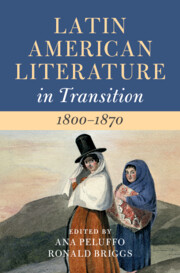Book contents
- Latin American Literature in Transition 1800–1870
- Latin American Literature in Transition
- Latin American Literature in Transition 1800–1870
- Copyright page
- Contents
- Figures
- Contributors
- Acknowledgments
- Introduction
- Part I Aesthetics of Disorder
- Chapter 1 The Paraguayan War Imagined
- Chapter 2 Networks of New World Authority
- Chapter 3 Artisans and Affective Labor
- Chapter 4 Reading (in) the Streets
- Chapter 5 Publicity and Print Culture
- Chapter 6 Literature and Political Corruption
- Chapter 7 Emotions and Politics in the Era of Caudillos
- Part II Affective Communities
- Part III Intersectional Subjectivities
- Part IV Transoceanic Consciousness
- Index
- References
Chapter 2 - Networks of New World Authority
from Part I - Aesthetics of Disorder
Published online by Cambridge University Press: 24 January 2023
- Latin American Literature in Transition 1800–1870
- Latin American Literature in Transition
- Latin American Literature in Transition 1800–1870
- Copyright page
- Contents
- Figures
- Contributors
- Acknowledgments
- Introduction
- Part I Aesthetics of Disorder
- Chapter 1 The Paraguayan War Imagined
- Chapter 2 Networks of New World Authority
- Chapter 3 Artisans and Affective Labor
- Chapter 4 Reading (in) the Streets
- Chapter 5 Publicity and Print Culture
- Chapter 6 Literature and Political Corruption
- Chapter 7 Emotions and Politics in the Era of Caudillos
- Part II Affective Communities
- Part III Intersectional Subjectivities
- Part IV Transoceanic Consciousness
- Index
- References
Summary
José María Blanco White has frequently been credited with bringing to the issue of Spanish American independence the moderate sensibility of Edmund Burke, known for his realism about North American independence (Murphy 82; Pons 197; Fernández 120).
- Type
- Chapter
- Information
- Latin American Literature in Transition 1800–1870 , pp. 38 - 52Publisher: Cambridge University PressPrint publication year: 2022



